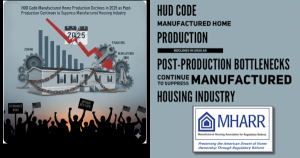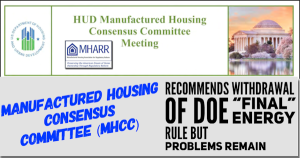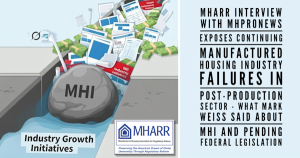[vc_row][vc_column][vc_column_text]A new bill has been introduced in Congress by Rep. Norma Torres (D-CA) that would impact both the regulation of manufactured housing by the U.S. Department of Housing and Urban Development (HUD) and, potentially, the utilization of HUD-regulated manufactured housing by local jurisdictions that receive housing-related federal grants from HUD. If pursued correctly by the industry’s post-production sector, this legislation could provide potentially-significant market opportunities for manufactured housing retailers, communities, developers and finance companies.
The bill, titled the “HUD Manufactured Housing Modernization Act of 2017 (H.R. 3793), contains two essential elements. First, it would require HUD, in issuing “any new rule or regulation,” to “include, as appropriate, guidelines that assess the impact of the rule or regulation on owners of residential manufactured homes and the production and sale of residential manufactured homes.” Second, it would require the HUD Secretary to “issue guidelines for jurisdictions related to the appropriate inclusion of residential manufactured homes in a Consolidated Plan of the jurisdiction.”
If enacted, this bill would be potentially significant for both the manufactured housing industry and consumers of affordable manufactured housing, in that it would supplement and expand the scope of language currently contained in the Manufactured Housing Construction and Safety Standards Act of 1974 (as amended) which requires HUD to assess the cost-impact of new or amended standards and regulations (and interpretations of both) on the cost of manufactured homes “to the public.” This expansion is potentially important for industry members (including the post-production sector) and consumers, in that it would – for the first time – recognize and make relevant to the rulemaking process, cost impacts directly affecting the “production and sale” of HUD-regulated manufactured homes (which the program, under its current administrator seeks to ignore). In particular, if enacted as currently drafted, it would clarify that the relevant focus of the statutory cost analysis is the impact of the new or amended rule or regulation on the “owner” of the home and the cost of the “production and sale” of the home.
Further, the bill would make manufactured housing a feature of the “Consolidated Plans” submitted by jurisdictions applying for HUD federal grants. Such “Consolidated Plans,” according to an official HUD statement, are: “designed to help states and local jurisdictions to assess their affordable housing and community development needs…. The consolidated planning process serves as the framework … to identify housing and community development priorities that align and focus funding from the CPD formula block grant programs: [the] Community Development Block Grant (CDBG) Program, HOME Investment Partnerships (HOME) Program, Emergency Solutions Grant (ESG) Program, and Housing Opportunities for Persons with AIDS (HOPWA) Program.”
MHARR has been tracking this bill and monitoring it closely, and has already addressed various specific aspects in person with Rep. Torres’ office. The Association will continue to follow this bill as it progresses through the legislative process.[/vc_column_text][/vc_column][/vc_row]













